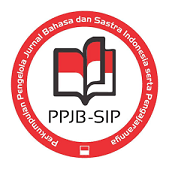Strategi Guru dalam Pembelajaran Wawancara Siswa di Kelas VIIID MTs. Negeri Mendoyo
DOI:
https://doi.org/10.23887/jjpbs.v3i1.6367Abstrak
Penelitian ini menggunakan rancangan penelitian deskriptif kualitatif yang bertujuan mengetahui (1) strategi guru dalam perencanaan pembelajaran wawancara, (2) pelaksanaan pembelajaran wawancara, dan (3) evaluasi pembelajaran wawancara yang dilakukan di kelas VIID MTs. Negeri Mendoyo. Subjek penelitian adalah guru bahasa Indonesia yang mengajar di kelas VIIID MTs. Negeri Mendoyo. Metode pengumpulan data yang digunakan, yaitu metode observasi, dokumentasi, dan wawancara. Data dianalisis dengan menggunakan model analisis deskriptif kualitatif melalui tiga tahapan, yaitu reduksi data, penyajian data, dan penyimpulan. Hasil penelitian ini adalah (1) strategi guru dalam perencanaan pembelajaran bahasa Indonesia berbasis KTSP sudah terlihat dari adanya pencantuman beberapa komponen dalam RPP, seperti: SK, KD, tujuan pembelajaran, media pembelajaran, langkah-langkah pembelajaran, dan evaluasi pembelajaran. Dalam perencanaan perlu juga memilah antara waktu yang tersedia dan media yang akan digunakan agar tercapai tujuan pembelajaran yang diinginkan. (2) Pelaksanaan pembelajaran wawancara menggunakan tiga strategi, yaitu strategi yang berpusat pada guru, berpusat pada siswa dan berpusat pada materi pelajaran. Namun, guru lebih menekankan proses pengajarannya pada strategi yang berpusat pada siswa. (3) Evaluasi pembelajaran wawancara yang dilaksanakan melalui penilaian praktik dan tertulis. Peniaian praktik dilakukan saat siswa berwawancara dengan narasumber dan penialaian tertulis dilakukan ketika siswa menulis hasil wawancara menjadi sebuah rangkuman.Kata Kunci : strategi guru, pembelajaran wawancara
This study used a qualitative descriptive study design aims to determine (1) the strategy of teachers in lesson planning the interview, (2) the implementation of learning interviews, and (3) evaluation of learning in the classroom interviews conducted VIID MTs. Mendoyo country. Subjects were Indonesian teachers who teach in the classroom VIIID MTs. Mendoyo country. Data collection methods are used, the method of observation, documentation, and interviews. Data were analyzed using qualitative descriptive analysis model through three stages, namely data reduction, data presentation, and inference. Results of this study were (1) the learning plan based SBC Indonesian evident from the existence of several components in the RPP, such as: SK, KD, learning objectives, instructional media, learning steps, and evaluation of learning. Planning should also sort out between the time available and the media that will be used to achieve the desired learning objectives. (2) learning peleksanaan interview using three strategies, namely strategies teacher-centered, student-centered and focused on the subject matter. However, the teachers put more emphasis on the teaching process student-centered strategy. (3) evaluation of learning that teachers carry out interviews can be seen from the assessment and written practice. Peniaian done when students practice interview with speakers and teachers assess students' interviews were written into a summary.
keyword : teacher strategies , learning interview
Diterbitkan
2016-01-26
Terbitan
Bagian
Articles
Lisensi
Authors who publish with the Jurnal Pendidikan Bahasa dan Sastra Indonesia Undiksha agree to the following terms:- Authors retain copyright and grant the journal the right of first publication with the work simultaneously licensed under a Creative Commons Attribution License (CC BY-SA 4.0) that allows others to share the work with an acknowledgment of the work's authorship and initial publication in this journal
- Authors are able to enter into separate, additional contractual arrangements for the non-exclusive distribution of the journal's published version of the work (e.g., post it to an institutional repository or publish it in a book), with an acknowledgment of its initial publication in this journal.
- Authors are permitted and encouraged to post their work online (e.g., in institutional repositories or on their website) prior to and during the submission process, as it can lead to productive exchanges, as well as earlier and greater citation of published work. (See The Effect of Open Access)







